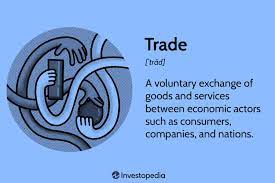Navigating the Complexities of International Trade: A Guide to Global Commerce

The Impact of Trade on Global Economy
Trade plays a crucial role in the interconnected world we live in today. It is the exchange of goods and services between countries, enabling specialization, efficiency, and economic growth. The effects of trade reverberate across nations, shaping economies and influencing livelihoods.
Benefits of Trade
Trade allows countries to utilize their available resources efficiently. By specializing in the production of goods and services where they have a comparative advantage, nations can increase productivity and output. This leads to lower prices for consumers, a wider variety of products, and overall economic prosperity.
Furthermore, trade fosters innovation and competition. When businesses are exposed to international markets, they are incentivized to improve quality, reduce costs, and develop new technologies to stay competitive. This drive for innovation benefits not only businesses but also consumers who gain access to better products at competitive prices.
Challenges of Trade
While trade brings numerous benefits, it also presents challenges that need to be addressed. One common concern is the impact of trade on employment. Industries that face stiff competition from imports may experience job losses as companies struggle to remain viable in the global marketplace.
In addition, trade can lead to income inequality within countries if the gains from trade are not distributed equitably among different segments of society. It is essential for policymakers to implement measures that ensure the benefits of trade are shared broadly and help those adversely affected by market forces.
The Future of Trade
The landscape of global trade is constantly evolving with advancements in technology, changes in consumer preferences, and shifts in geopolitical dynamics. As we look towards the future, it is crucial for countries to embrace sustainable trade practices that promote economic growth while safeguarding environmental resources and social well-being.
Collaboration among nations through agreements such as free trade agreements and multilateral organizations like the World Trade Organization can help facilitate smoother trade relations and address common challenges collectively.
In Conclusion
Trade remains a cornerstone of the global economy, driving growth, fostering innovation, and connecting nations around the world. By understanding the complexities of trade and working together to overcome its challenges, we can build a more prosperous future for all.
Six Benefits of Trade: Driving Growth, Innovation, and Global Connection
- Promotes economic growth by allowing countries to specialize in their areas of comparative advantage.
- Leads to lower prices for consumers due to increased competition and efficiency.
- Encourages innovation as businesses strive to stay competitive in the global marketplace.
- Creates job opportunities in industries that benefit from increased trade and export opportunities.
- Fosters cultural exchange and understanding between nations through the exchange of goods and services.
- Helps diversify sources of goods, reducing dependency on domestic production and mitigating supply chain risks.
7 Drawbacks of Trade: From Job Displacement to Loss of Sovereignty
- 1. Job Displacement
- 2. Income Inequality
- 3. Environmental Impact
- 4. Dependence on Imports
- 5. Exploitation of Labor
- 6. Cultural Homogenization
- 7. Loss of Sovereignty
Promotes economic growth by allowing countries to specialize in their areas of comparative advantage.
Trade promotes economic growth by enabling countries to focus on producing goods and services in which they have a comparative advantage. This specialization allows nations to allocate their resources more efficiently, leading to increased productivity and output. By trading with other countries for goods that they cannot produce as efficiently themselves, nations can expand their markets, drive innovation, and ultimately boost their overall economic prosperity. The concept of comparative advantage underscores the importance of trade in optimizing global resource allocation and fostering sustainable economic development.
Leads to lower prices for consumers due to increased competition and efficiency.
One significant advantage of trade is its ability to lead to lower prices for consumers. This occurs as a result of increased competition and efficiency in the market. When countries engage in trade, businesses are exposed to a broader consumer base, encouraging them to enhance their productivity and offer goods at competitive prices. The competition among producers not only drives down prices but also motivates them to streamline their operations, reduce costs, and improve the quality of their products. As a result, consumers benefit from a wider variety of affordable goods and services, ultimately enhancing their purchasing power and overall standard of living.
Encourages innovation as businesses strive to stay competitive in the global marketplace.
Encouraging innovation is a significant advantage of trade as businesses seek to maintain competitiveness in the global marketplace. When companies are exposed to international trade, they are motivated to enhance their products, services, and processes to meet the demands of a diverse consumer base. This drive for innovation not only leads to improved quality and efficiency but also fosters technological advancements that benefit society as a whole. By constantly striving to stay ahead in the competitive global landscape, businesses push the boundaries of creativity and ingenuity, ultimately driving progress and economic growth.
Creates job opportunities in industries that benefit from increased trade and export opportunities.
Increased trade and export opportunities have the potential to create job opportunities in industries that thrive on global market access. When businesses can tap into international markets, they often experience growth in demand for their products or services, leading to expansion and the need for additional skilled workers. This influx of job opportunities not only benefits the companies directly involved in exporting but also supports a ripple effect throughout the supply chain and related sectors, ultimately contributing to economic development and employment stability.
Fosters cultural exchange and understanding between nations through the exchange of goods and services.
Trade serves as a powerful catalyst for fostering cultural exchange and enhancing mutual understanding between nations. Through the exchange of goods and services, countries not only engage in economic transactions but also share aspects of their unique cultures, traditions, and values. This cultural interchange promotes empathy, respect, and appreciation for diversity, ultimately bridging gaps and building connections across borders. By facilitating these interactions, trade contributes to a more interconnected and harmonious global community where people can learn from one another and celebrate the richness of shared experiences.
Helps diversify sources of goods, reducing dependency on domestic production and mitigating supply chain risks.
Trade serves as a valuable mechanism for diversifying sources of goods, thereby lessening reliance on domestic production and mitigating supply chain risks. By engaging in international trade, countries can access a broader range of products from various global markets, reducing vulnerability to disruptions in domestic production or supply chain bottlenecks. This diversification not only enhances the availability of goods but also enhances resilience in the face of unforeseen challenges, ensuring a more stable and sustainable flow of essential resources.
1. Job Displacement
Job displacement is a significant con of trade, as it can result in job losses within industries that struggle to compete with cheaper imports. When countries open up their markets to international trade, domestic industries may find it challenging to maintain their competitiveness against foreign producers who can offer lower-priced goods. This can lead to layoffs and closures in sectors where local businesses cannot keep up with the pricing and quality of imported products. Job displacement due to trade can have profound effects on workers and communities, requiring thoughtful policies and support mechanisms to help those impacted transition to new opportunities in a changing economic landscape.
2. Income Inequality
Income inequality is a significant con associated with trade, as the unequal distribution of trade benefits can widen the wealth gap within a nation. When the gains from trade predominantly benefit certain industries or segments of society, it can lead to disparities in income levels and opportunities. This can further exacerbate social and economic inequalities, potentially leaving marginalized groups behind and hindering overall societal progress. Addressing income inequality resulting from trade requires thoughtful policies and strategies to ensure that the benefits are shared more equitably across all sectors of the economy.
3. Environmental Impact
Increased trade can have a significant environmental impact, contributing to higher carbon emissions and resource depletion. The transportation of goods across long distances and the production processes involved in meeting global demand can lead to a rise in greenhouse gas emissions, exacerbating climate change. Additionally, the extraction and consumption of natural resources to support increased trade can put a strain on ecosystems, leading to deforestation, water scarcity, and loss of biodiversity. Addressing these environmental challenges is crucial in balancing the benefits of trade with sustainable practices that minimize harm to the planet.
4. Dependence on Imports
Dependence on imports poses a significant challenge for countries as it can lead to vulnerability in the face of supply chain disruptions or price fluctuations. Relying heavily on imported goods means that a country’s access to essential products is contingent upon factors outside its control, such as geopolitical tensions, natural disasters, or trade disputes. In times of crisis or uncertainty, disruptions in the supply chain can have far-reaching consequences, impacting availability and affordability of goods for consumers and businesses alike. This con of trade highlights the importance of diversifying sources of goods and building resilience in supply chains to mitigate risks associated with overreliance on imports.
5. Exploitation of Labor
One significant con of trade is the exploitation of labor, where certain countries resort to unfair labor practices to reduce production costs and enhance their competitiveness in the global market. This unethical approach can lead to poor working conditions, low wages, long hours, and lack of workers’ rights protection. Such exploitation not only harms the well-being of workers but also creates an uneven playing field in trade, as companies in these countries can offer goods at lower prices due to the exploitation of labor. Addressing and mitigating this issue is crucial to ensure that trade benefits all stakeholders fairly and ethically.
6. Cultural Homogenization
Extensive trade can inadvertently contribute to cultural homogenization, where certain dominant cultures overshadow and potentially erode the rich tapestry of cultural diversity that exists globally. As goods and services flow across borders, there is a risk that local traditions, languages, and customs may be marginalized or lost in the face of more pervasive global influences. This con of trade highlights the importance of preserving and celebrating unique cultural identities amidst the interconnectedness brought about by international trade. Efforts to promote cultural exchange and appreciation can help mitigate the negative impacts of cultural homogenization while fostering a more inclusive and diverse global community.
7. Loss of Sovereignty
One significant drawback of trade is the potential loss of sovereignty that countries may experience due to trade agreements. These agreements can restrict a nation’s autonomy by imposing limitations on its ability to implement specific policies or regulations that may contradict international trade rules. This loss of sovereignty can hinder a country’s capacity to protect its domestic industries, regulate environmental standards, or enact social welfare measures, as these actions could be deemed as barriers to trade. As a result, nations must carefully balance the benefits of participating in global trade with the potential constraints on their ability to govern independently and address local needs effectively.


